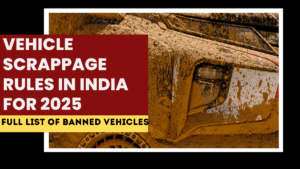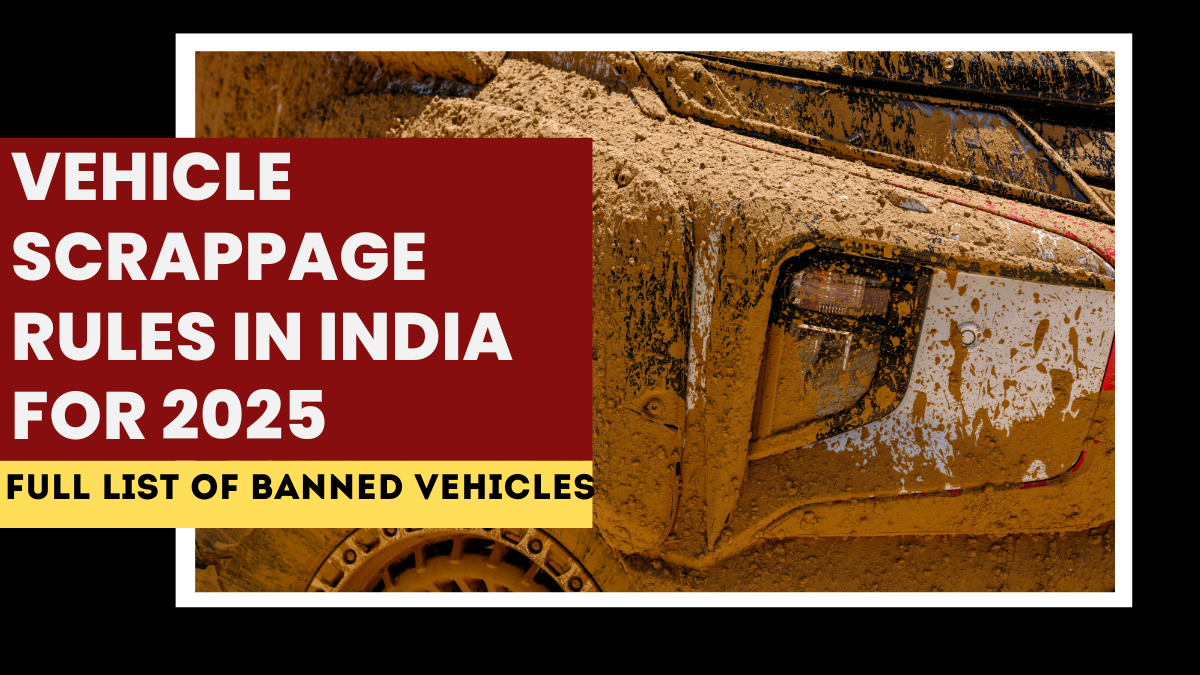The Government of India’s vehicle scrappage policy 2025 marks one of the most significant reforms in the automobile sector. Implemented to reduce pollution, improve road safety, and boost demand for newer vehicles, the updated rules affect millions of vehicle owners. From October 2025, several categories of older cars, two-wheelers, and commercial vehicles will either face higher taxes or outright bans on registration renewal. This guide explains the old vehicle ban rules, the updated scrappage guidelines, and the list of vehicles affected in 2025.

Objective of the Vehicle Scrappage Policy
The primary aim of the 2025 scrappage policy is to phase out unfit, unsafe, and polluting vehicles. The government has set clear objectives:
-
Reduce Air Pollution: Older vehicles contribute disproportionately to emissions.
-
Promote Fuel Efficiency: Encourage replacement with BS6, BS7, hybrid, and EV models.
-
Improve Road Safety: Older vehicles often lack airbags, ABS, and crash protection.
-
Boost Economy: Scrap yards create jobs and increase demand for new vehicles.
Rules Under the 2025 Scrappage Policy
The updated vehicle scrappage policy in India 2025 outlines the following:
-
Private Cars
-
Vehicles older than 20 years without a valid fitness certificate are banned from road use.
-
Fitness tests are mandatory every five years for cars above 15 years.
-
Higher re-registration fees apply for cars above 15 years.
-
Commercial Vehicles
-
Vehicles older than 15 years must pass annual fitness tests.
-
Failure results in cancellation of registration.
-
Commercial vehicles that fail emission tests are banned immediately.
-
Government Vehicles
-
All government-owned cars and buses older than 15 years will be scrapped compulsorily from October 2025.
-
Green Tax
-
Old petrol vehicles attract 10–15% extra tax at re-registration.
-
Old diesel vehicles attract 15–20% extra tax at re-registration.
Vehicles Banned or Restricted in 2025
Based on the new rules, here’s the list of vehicles most affected:
-
Diesel cars over 10 years old in NCR (Delhi, Noida, Gurgaon): Already banned under NGT guidelines, reinforced under scrappage rules.
-
Petrol cars over 15 years old: Cannot be re-registered without fitness certificates.
-
Commercial trucks and buses over 15 years: Banned if failing emission norms.
-
Government fleet vehicles: All 15+ year-old cars to be scrapped automatically.
Incentives for Scrapping Vehicles
To encourage compliance, the government and automakers are offering benefits:
-
Scrappage Certificates: Owners get a certificate after scrapping, which provides discounts on new car purchases.
-
Tax Rebates: Road tax rebates up to 25% for personal cars and 15% for commercial vehicles when replacing scrapped vehicles.
-
Manufacturer Discounts: Carmakers like Tata, Mahindra, and Maruti Suzuki are offering additional exchange bonuses.
-
Lower Loan Rates: Banks are introducing special car loan schemes for scrappage certificate holders.
Impact on Car Owners
For vehicle owners, the new rules have both challenges and advantages.
-
Higher Costs for Old Vehicles: Maintaining a car older than 15 years now attracts higher taxes and frequent fitness tests.
-
Forced Upgrades: Many owners will be compelled to shift to newer cars or EVs.
-
Resale Market Changes: Used cars over 12–15 years old have lost value significantly.
-
Incentives on New Cars: Scrappage benefits make new cars slightly more affordable despite rising road tax.
Impact on the Automobile Industry
The scrappage rules are expected to reshape India’s auto market in 2025.
-
Boost in Sales: Automakers expect a demand surge as old vehicles are scrapped.
-
Growth of EVs: Many owners are opting for electric cars to avoid future bans.
-
Scrappage Centers Expansion: More authorized scrappage facilities are being set up across states.
-
Fleet Renewal: Public transport fleets will undergo large-scale modernization.
How to Scrap a Vehicle in 2025
The government has introduced a structured scrapping process:
-
Visit an authorized scrappage center listed by the Ministry of Road Transport and Highways (MoRTH).
-
Submit RC, insurance papers, and identity proof.
-
Vehicle is deregistered from the RTO.
-
Scrappage certificate is issued to claim new vehicle benefits.
Conclusion
The vehicle scrappage policy 2025 is a crucial step toward reducing India’s vehicular pollution and improving road safety. While owners of older cars may face higher costs or bans, the policy provides opportunities to upgrade to safer and greener vehicles with financial benefits. For the automobile industry, this shift opens new avenues of growth, especially in the EV and hybrid segments.
FAQs
Which vehicles are banned under the 2025 scrappage policy?
Diesel cars above 10 years in NCR and petrol cars above 15 years nationwide without fitness certificates are banned.
Do I get any benefit if I scrap my old vehicle?
Yes, scrapping provides a certificate that can be used for tax rebates, manufacturer discounts, and lower loan rates on new cars.
How often do old cars need fitness tests?
Private cars above 15 years require fitness tests every five years, while commercial vehicles need annual checks.
Are government vehicles also included in scrappage rules?
Yes, all government cars and buses older than 15 years will be scrapped from October 2025.
Can I sell my 20-year-old car in another state?
No, the scrappage rules apply across India, and transferring to another state will not bypass bans.
Click here to know more.
